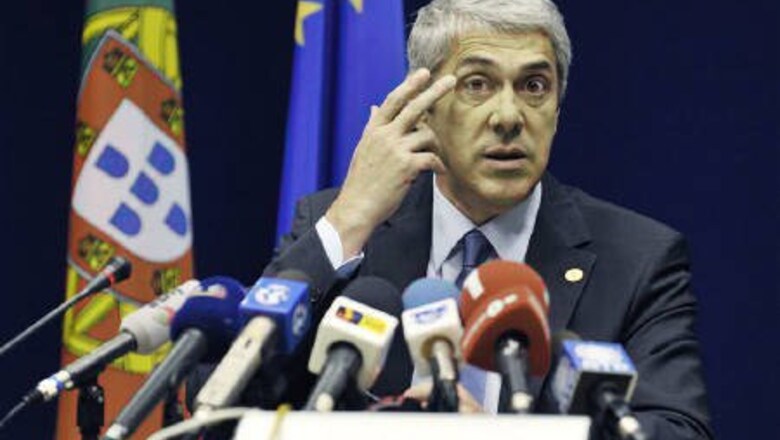
views
Lisbon: Portuguese leaders agreed tough austerity measures on Thursday, joining a coordinated Euro zone push that has calmed market fears of a spreading Greek-style crisis but provoked talk by Spanish unions of a general strike.
Prime Minister Jose Socrates and opposition leader Pedro Passos Coelho drew up steps to slash Portugal's budget deficit, including 5 percent pay cuts for senior public sector staff and politicians, and increases of VAT sales tax, income tax and profits tax ranging from 1 to 2.5 percent.
The cabinet approved the programme later. The government said it would cut the deficit to 7.3 percent of GDP this year and 4.6 percent in 2011. Last year it hit 9.4 percent, prompting a sell-off of Portuguese assets by investors.
"I ask all my compatriots for us to make this effort to defend the country, to defend the Euro and Europe," Socrates, a Socialist, told a news briefing.
In neighbouring Spain, painful measures were announced on Wednesday including 5 percent reductions in civil service pay and job cuts.
"We radically reject this austerity plan and both (main) unions are starting protests that could lead to a general strike very soon," said Ignacio Fernandez Toxo, general secretary of Spain's biggest union Comisiones Obreras.
A public sector strike is planned for June 2. Union leaders said the austerity plan breached pension pacts and that economies should come from tax increases rather than cuts.
The belt-tightening is the price indebted euro zone states must pay for protection by the 750 billion euro ($950 billion) safety net announced by the EU and IMF at the weekend.
German Chancellor Angela Merkel said on Thursday the EU faced an "existential" crisis.
"If the euro fails, not only the currency fails. Europe fails too, and the idea of European unification," she said.
"We have a common currency, but no common political and economic union. And this is exactly what we must change. To achieve this -- therein lies the opportunity of this crisis."
In the decade since the euro was created, Germany has resisted the idea of tightening economic policy coordination, fearful states like France could exploit such a discussion to try to exert influence over the European Central Bank.
German public opinion is resentful of the potential financial burdens being shouldered by Berlin in the rescue package for weaker economies. A poll on Thursday showed waning public enthusiasm in Denmark for adopting the troubled Euro.
US President Barack Obama has been in contact with European leaders on the Euro issue, the White House said.
"This is obviously something the president has been concerned about, having called leaders in Europe to discuss aggressive measures they ought to be taking and are taking to ensure their economy and the Euro is strong," White House spokesman Bill Burton told reporters aboard Air Force One.
Vice President Joe Biden telephoned Britain's new Deputy Prime Minister, Nick Clegg, and Biden's office said they discussed "the need for continued decisive action to meet the challenges facing European economies."
White House economic adviser Paul Volker told students at the London School of Economics on Thursday he was concerned that Europe's debt troubles could undermine the euro, and said it was difficult to have a common currency without a common government.
Markets Revive
World stocks have gained around 6 percent since the rescue package was announced.
The pan-European FTSEurofirst 300 has climbed more than 8 percent this week, regaining losses suffered as investors' confidence in the Euro zone withered last week.
But the single currency fell to a one-week low on Thursday, weighed down by worries that fiscal tightening in the zone could stifle growth and that weak members of the bloc might not be able to deliver required budget cuts.
Safe-haven gold continued to trade near record highs.
"It's going to be a long, challenging and bumpy road in order to stabilise the finances of many countries within the euro zone, but it's absolutely necessary that they take those first steps," said Henk Potts, equity strategist at Barclays Wealth.
The new coalition cabinet in Britain, a member of the EU but not the euro currency club, met for the first time on Thursday and agreed a 5 percent pay reduction for all ministers.
Less symbolic and more substantial cuts are high on its agenda to tackle a record budget deficit of over 11 percent, marking the end of "spend-to-mend" policies advocated by former Prime Minister Gordon Brown in response to global downturn.
Those policies, applied by many governments, led to a glut of bond issuance which, in the case of highly indebted states, investors became reluctant to buy.
Spanish and Portuguese borrowing costs soared last week as investors fled peripheral Euro zone government bonds.
But Portugal and Germany staged successful bond auctions on Wednesday after European Central Bank purchases of Euro zone government debt in the market steadied investor nerves. The risk premium on Greek debt hit a three-week low.
A British government bond auction on Thursday was heavily oversubscribed.
Luca Paolazzi, chief economist of the Italian employers' lobby, told Reuters on Thursday Italy did not need the kind of urgent measures adopted by Spain but he called for a freeze of public sector pay and a raising of the retirement age.
In a drive to tighten fiscal discipline and prevent a re-run of Greece's fraudulent statistics and ballooning deficit, EU Economic and Monetary Affairs Commissioner Olli Rehn unveiled proposals for greater budget coordination on Wednesday.
The key plank would make governments submit their draft budgets to Brussels for scrutiny and peer review by other member states before they are adopted by national parliaments.




















Comments
0 comment